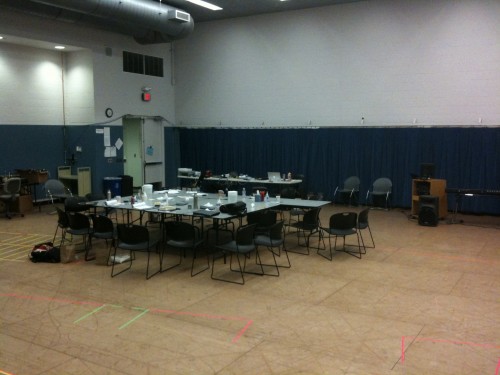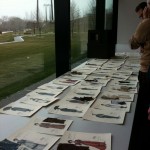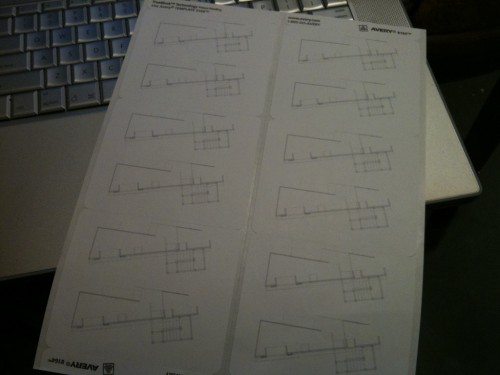Step 1: Coffee
 I’m kinda tired, and I still have some work to do tonight. So I decided to experiment with an area of domesticity that I don’t generally dabble in: making coffee at home. I don’t generally make coffee. I’m a far better stage manager than a PA. To me, coffee is something you pay $4 for, and a barista makes it using some mathematical formula of beans, water, milk and sugar that I don’t need to be involved in.
I’m kinda tired, and I still have some work to do tonight. So I decided to experiment with an area of domesticity that I don’t generally dabble in: making coffee at home. I don’t generally make coffee. I’m a far better stage manager than a PA. To me, coffee is something you pay $4 for, and a barista makes it using some mathematical formula of beans, water, milk and sugar that I don’t need to be involved in.
When we started rehearsal I brought my travel mug that I bought in New Mexico during the tour last year, and threw together some concoction of ingredients that tasted OK. I was kind of excited by this experiment. Our awesome intern Ashley makes the coffee every morning, and sometimes when I ask, “Is the coffee ready?” I am directed to take note of the freshly made coffee that is already in my mug and on my desk, formed of some combination of creamer and sugar that we have landed upon as “the way I like my coffee”, but that I don’t know how to make myself!
So suffice it to say, I consume a lot of coffee, but the act of putting water in a coffee maker and passing it through a filter filled with coffee grinds into a pot isn’t generally something I do on a regular basis. When I do, it’s because it’s part of my job (which it isn’t, technically, but that’s another story). On tour last year making coffee was usually my job, because on load-in day the crew would be working hard for about 8 hours while I took a nap and played on the internet. The tradeoff for this was that they could call me on the radio about 10 minutes before a break, and I would have fresh coffee waiting on the bus when they arrived.
Anyway, I bought some coffee in the supermarket (for possibly the first time in my life, for my own consumption at least), for reasons I don’t actually remember. I guess I decided that since my apartment is furnished with a coffee maker, I could use it, maybe to save money on energy drinks. And since the day we arrived, the coffee has sat on the kitchen counter unopened. Tonight I was tired and cold, so I actually attempted to make some to solve both problems. I did OK, as seen above.
Step 2: Homework
Now properly caffeinated, I turn to the main bulk of my homework for the night: our company manager, Joseph, has created weekly schedules for the entire tour. These need to be submitted to Equity to be checked for rule violations in terms of travel and performance hours. So my job is to check them for accuracy and any violations before they go to Equity. I’m kind of excited to see.
As many rules as there are about rehearsal hours, there are almost as many about travel. The reason I find it a little more difficult is that I never travel with the cast, so the whole thing is kind of a theoretical math puzzle as opposed to something remembered instinctively after having done it so many times.
After a refresher course through the LORT rulebook section on tours, and transferring the basic rules into a Google Wave that Nick and I (and anyone else we might need to include) can use for reference, I began looking over the schedule, checking each performance time against my database to make sure they all match up.
After having spent 3 hours doing this, I feel like I’ve gone through our entire tour, picturing a chronological trip through what our daily life (or more accurately, what the cast’s daily life) will be like on the road. What time the show will end, what time the bus call is the next day, how long the rest period is, how many hours of travel there are in a day vs. how many performances that day. Also checking to make sure there’s a day free of performances in each week, and a full day off from travel and performances every two weeks.
Joseph sent me the schedules in PDF, which would have been great if I had thought to print them while I was at the theatre. But in absence of a hard copy, I marked up the PDFs in Preview.app, and made notes of rest periods, overtime, and possible problem points if the show runs too long. As I went, I composed an email to Joseph listing my concerns (sometimes just correcting a typo) by date.
Some things may be tweaked a bit to avoid overtime, and sometimes there’s nothing that can be done, and it’s an expense the company just has to pay in order to make the next show. I’m sure the OT is small potatoes compared to the advantages of fitting in an extra performance in the schedule.
I’m just glad there are people at Equity whose job it is to approve this for real. It’s just one really long math problem, and I hate math.
A bus containing the cast of Romeo and Juliet leaves Baton Rouge at 10AM…







